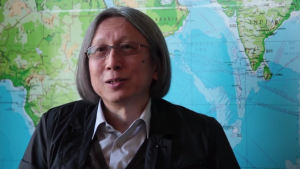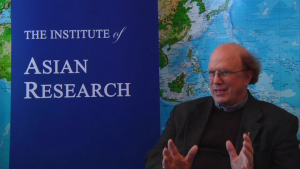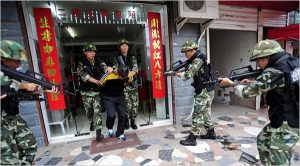Never-married Women in Southeast Asia
Memo #96 – In Southeast Asia the proportion of women who remain single past their childbearing years has been increasing. The figure tends to be higher among women who have tertiary education. There are significant implications when the number of never-married women becomes large: in Southeast Asia, women who do not marry tend not to have children and this will affect fertility levels. Also, what social identity will these women take in the absence of the wife-mother role?
Author Chan Koonchung on His Role as an Activist Public Intellectual
Memo #95 – On June 28, 2011, we published our first interview with Chan Koonchung (陈冠中), the author of the novel Shengshi-Zhongguo 2013 (盛世 – 中国 2013) or, The Fat Years. In this second installment he speaks about his role as an activist public intellectual. In 2010, he started an e-mail discussion group and NGO, Minjian China because he found that other Chinese intellectuals were not concerned with China’s impact outside of China, despite China’s role as a rising power. “Minjian” is one term for civil society. He has tried to identify scholars interested in China’s impact on the broader world, starting with Southeast Asia. He recently started a second online discussion group on China-India relations.
Self-searching Migrants: Japanese Temporary Residents in Canada in the Age of High Mobility and Self-Reflexivity
Memo #94 – The term “self-searching” (自分探し – jibun-sagashi) has become a cliché in Japan since the early 1990s, when the high-growth period ended. Economic stagnation obliged many new university graduates to get unstable and unfulfilling jobs. Since then, an increasing number of young Japanese have become “self-searching migrants” forming a new category of trans-Pacific migration. Just as migrants around the world have for centuries, Japanese young people are embarking on journeys across the Pacific in search of a professional or personal calling.
「自分探し」のグローバル移動: 流動化と自省の時代におけるカナダの日本人一時滞在者たち
Memo #94 – 「自分探し」という語は、1990年代初頭以来、日本であまりに安直に使われてきた決まり文句である。この時期日本ではバブル経済が崩壊し、大卒者でさえ多くが不安定な、やり甲斐のない仕事に就かざるを得なくなった。以来、「自分探しのための移動」をする若者たちは次第に増えていき、太平洋を越えて移動する者たちの中で新カテゴ
リーを形成している。
Re-examining China’s Periphery – Video Interview with Dr. Pitman Potter
Memo #93 – Pitman Potter’s recent book, Law, Policy, and Practice on China’s Periphery: Selective Adaptation and Institutional Capacity, examines the Chinese government’s policies and practices for relations with the Inner Periphery areas of Tibet, Xinjiang, and Inner Mongolia, and the Outer Periphery areas of Hong Kong and Taiwan.
Author Chan Koonchung on His Novel, Shengshi-Zhongguo 2013
Memo #92 – A noted cultural figure, writer, and public intellectual based in Beijing, Chan Koonchung (陈冠中) is the author of the pathbreaking novel Shengshi-Zhongguo 2013 (盛世中国 2013) or, The Fat Years. In this first of two interviews, he reflects on the implications of China becoming more wealthy and powerful. In 2008 he became convinced of China’s ineluctable rise and the prospect that it would soon be more advanced than Hong Kong and Taiwan. The novel is alive with characters and situations that speak tellingly and often in dystopic terms about what China’s future might hold.
Is Northern British Columbia De-Globalizing?
Memo #91 – Using the most common measure of economic openness – the ratio between exports and GDP – British Columbia’s (BC) economy has become less open in the past decade. In 2000, the provincial export to GDP ratio was over 25 per cent; by 2009 it had fallen to under 20 per cent. Is the province actually ‘de-globalizing?
AMRO – Fleshing out Regional Monetary Cooperation in East Asia
Memo #90 – On May 4, 2011, representatives of the ASEAN +3 group took another critical step forward in realizing the goal of a full-fledged regional financial entity. These developments have special importance given the leadership vacuum at the International Monetary Fund (IMF) and the intransigence of the European Union and the United States in further democratizing the process for leadership selection at the IMF.
Beijing’s Gamble: Preventing Social Unrest through Policy Reform?
Memo #89 – Two weeks ago three bombs went off at government offices in Jiangxi province. They were set by a farmer angered about his house being demolished. Local disputes remain common, especially over land. Inflation, particularly rising food prices, has raised social tensions and have sparked further protests. The leadership remains nervous.
China’s Counterinsurgency Strategy in Tibet and Xinjiang
Memo #88 – Separatist riots in Tibet in 2008 and in Xinjiang in 2009 demonstrated that Chinese authorities may be efficient at riot control. But the protests also indicate that China has not addressed the root causes of recurring ethnic unrest and deteriorating loyalty towards the Chinese regime among Tibetans and Uyghurs.






